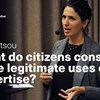considered
CANCELLED! All things considered? A cognitively plausible model of neighborhood choice
THIS SEMINAR IS UNFORTUNATELY CANCELLED. Elizabeth Bruch, University of Michigan (Attention: this seminar is held on a Monday) Although there have been efforts in recent years to study the linkages bet
Fairness-based retributivism reconsidered
Criminal Law & Philosophy, pp. 1-18, Online först. Abstract In this paper, I defend fairness-based retributivism against two important objections, the no-benefit objection and the social injustice o
The Democratic Boundary Problem Reconsidered
Ethics, Politics & Society. A Journal in Moral and Political Philosophy, N. 1, 2018, pp.89-122. Abstract Who should have a right to take part in which decisions in democratic decision making? This ““a people”, who takes decision in a democratic fashion. However, that a decision is made with a democratic decision method by a certain group of people doesn’t suffice for making the decision democratic or satisfactory from a democratic perspective. The group also has to be the right one. But what makes a group the right one? The criteria by which to identify the members of the people entitled to participate in collective decisions have been surprisingly difficult to pin down. In this paper, I shall revisit some of the problems discussed in my 2005 paper in light of some recent criticism and discussion of my position in the literature, and address a number of new issues.
Positive Egalitarianism Reconsidered
Utilitas Abstract According to positive egalitarianism, not only do relations of inequality have negative value, as negative egalitarians claim, but relations of equality also have positive value. The eg

Eri Bertsou: What do citizens consider to be politically legitimate uses of expertise?
Can democratic politics incorporate citizen demands for independent expertise in ways that boost legitimacy and trust in politics? Democratic governments worldwide face the dilemma of how to deal with
Eri Bertsou: Varieties of Expertise: What do citizens consider to be politically legitimate uses of expertise
Venue: Institutet för framtidsstudier, Holländargatan 13, 4th floor, Stockholm, and online Research seminar with Eri Bertsou, Assistant Professor of Political Science, University of St. Gallen (HSG).REG
Residential context and COVID-19 mortality among adults aged 70 years and older in Stockholm: a population-based, observational study using individual-level data
The Lancet Healthy Longevity' Abstract Housing characteristics and neighbourhood context are considered risk factors for COVID-19 mortality among older adults. The aim of this study was to investigate h
The Phenomenology of Specialization of Criminal Suspects
Abstract A criminal career can be either general, with the criminal committing different types of crimes, or specialized, with the criminal committing a specific type of crime. A central problem in the
Four Phases in Demographic Transition: Implications for Economic and Social Developments in Sweden 1820-2000
In contrast to earlier research, historical and contemporary comparisons to Swedish demographical changes show that the age group upon which the population growth is based—either child, adult, maturit
Health as a Factor in Regional Economic Development
The health of the European workforce is a crucial issue as the share of old age people as well as the mean age increases, moreover the interest in the relation between health and productivity of busin








